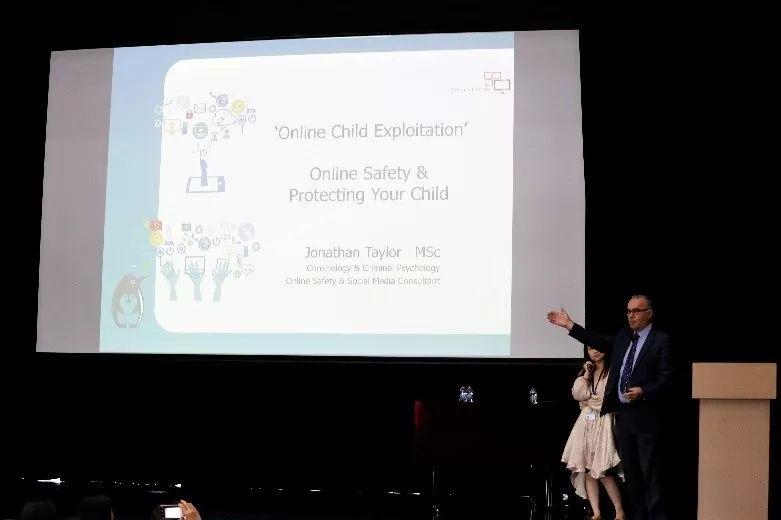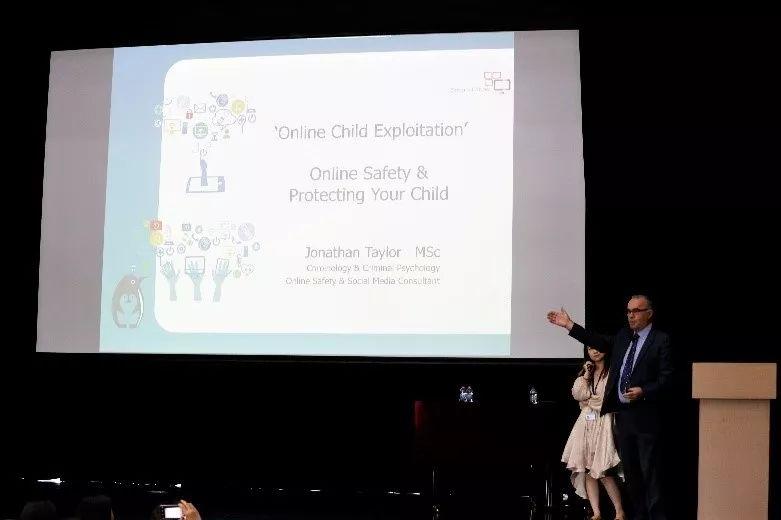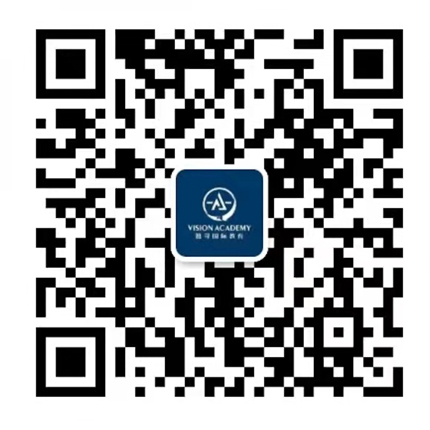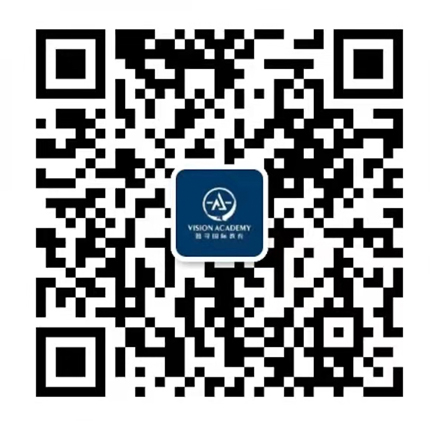、点击蓝字关注↑,了解更多诺德安达精彩内容!
在本学期早些时间,我们特地邀请了来自英国的Jon Taylor先生,一位在学生网络安全方面的专家,前来我校带来了一场面向家长的讲座,讲座主题是“网络安全-社交媒体和游戏问题-保护您的孩子”。

作为一名网络安全和社交媒体专家,Jon将他之前从事的卧底工作及15年的调查经验运用到网络行为领域。他是国际公认的网络风险和危险方面的专家。
Jon在国内外学校发表了许多演讲,帮助家长/监护人和教师了解网络风险并提供建议,确保孩子在网络世界的安全。Jon利用案例研究和调查来突显这些问题。
作为电视网络安全专家,Jon经常出现在BBC电视台、天空新闻、第四频道和ITV电视台的《今晨》节目中。 最近,他还出现在哥伦比亚广播公司的10部纪录片《点击4谋杀》中。

在讲座中,Jon围绕着为什么作为家长要关心网络安全、在网络环境中可能存在的危险、如何正确地理解现今的数字世界、如果有效的保证孩子的网络安全和作为学校我们应该如何帮助孩子杜绝网络中存在的危险等问题进行了讲解。

借助这次难得的机会,我们还特地对Jon进行了一次采访,大家可以通过如下视频了解Jon对于如何保证孩子上网安全的个人建议。
小孩子天生热爱科技,现在的孩子们在越来越小的年纪就开始访问互联网。除了Jon所给的建议,我们还为大家提供以下四个步骤,随时随地保证孩子们的上网安全。

1.将计算机放在家中或家庭空间中显眼的位置
2.不要让孩子在自己的房间里独自使用笔记本电脑
3. 控制网络流量,并考虑为年幼的孩子提供可以断开互联网使用的设备
4.与孩子分享互联网的使用规范(不是说教的方式)。对于达到一定年龄的孩子,与其共同商议合理的上网时间
5.一旦违反了立下的规矩,家长要立场坚定。禁止将 iPad 或手机留在孩子的卧室里过夜
6.与您的孩子一起谈论他们访问的内容,与孩子们一起上网
7.定期检查浏览器历史记录

1.向孩子解释如何在社交媒体上使用安全功能
2.探讨在线隐私问题 - 包括过度分享的危险。有时分享是件好事,但孩子们应该意识到过度分享的危险,以及这将对他们现在或以后的声誉产生何种影响。
3.在网上,不是每个人都能做到坦诚相待。重要的是让您的孩子知道网上存在很多虚假用户、在线侵犯者和想要窃取信息的人。让您的孩子对那些提出见面要求或索要钱款的陌生人保持警惕。

1.向孩子们解释他们在网上看到的内容的真实情况,以及当面对不恰当的内容(如色情、暴力或恶意评论等)时,应如何做出反应。
2.我们需要让年轻人知道虚拟世界与现实世界应保持相同的标准,具体包括以下方面:
3.与他人互动时的基本礼貌:我们决不允许孩子在学校里欺负别人,也不希望我们自己的孩子受到欺负。家长应该提醒孩子,网络欺凌,如辱骂、散布谣言、威胁或诋毁某人,是不恰当的伤害性行为。
4.向外泄露个人信息:在商场里,我们不会向陌生人提供我们的地址和电话号码。同样,我们不应该在网上发布这些信息。
5.确保孩子在出现任何问题时都能及时寻求家长的帮助
6.融入孩子的网络生活 - 表现出兴趣并让整个家庭参与其中
7.了解您的孩子喜欢哪些网站并讨论原因

1.不要让平板电脑或手机成为孩子的保姆,代替家长的陪伴。有时我们树立的是负面榜样。我们经常会使用手机回复电子邮件或者打发上下班路上的时间,但我们需要小心,确保这种行为不会影响孩子们的社会观。
2.让亲子时间远离网络。
3.在线全球校园为学生提供了一个与全世界的同龄人交流互动的平台,让孩子们在诺德安达教育集团员工和老师的监督下,享受安全的学习环境。了解您的孩子如何使用全球校园平台来支持他们完成在校学习。


联系我们
招生老师:张老师,陆老师,卫老师,李老师,王老师
联系电话:+86 21 24038800 分机:4021,4027,4019,4045, 4020
联系邮箱:apply@nacis.cn
联系地址:上海市闵行区金辉路1399号
学校官网:
www.nacisminhang.cn

How to keep your child safe online?
Earlier this semester, we invited Mr. Jon Taylor, a leading British authority on students’ online safety for to give a presentation on the topic of ‘Online Safety - Social Media & Gaming Issues - Protecting your Child’ to our parents.

As an Online Safety and Social Media Expert, Jon loves to combine his previous undercover work and 15-year research into his study of Online Behaviour. He is an internationally recognised expert in the field of Online Risks and Dangers.
Jon speaks to schools nationally and internationally and at the same time helps parents/foster carers and teachers understand the online risks by giving advice that can protect children/students in the online world.
Jon uses case studies and investigations to highlight the issues. Jon regularly appears on BBC TV, Sky News, Channel 4 and ITV’s This Morning as TV Online Safety Expert. He recently appeared in 10 CBS Documentaries ‘Click 4 Murder’.

During the presentation, Jon talked about why parents should care about online safety, some possible dangers caused by unsafe internet environment, how to understand the digital world appropriately, some top tips to keep children safe online and how to protect our students as a school.

We also took this opportunity to interview Mr. Jon. Please watch the video below to learn the tips that Jon gave on how to keep children safe online.
Children love using technology innately and are accessing the internet at an increasingly younger age.
Here are four steps to help keep your child safe whenever and wherever they surf the internet.

1.Keep your computer in a conspicuous area at your home or family space.
2.Never let your children have a laptop in their room.
3. Keep control of the network flow and consider to give non-internet enabled devices to younger children.
4. Have a conversation (not preaching) about how they are using the internet. For older children, discuss with them on the reasonable internet time.
5.Be firm when they break the rules you set and do not allow iPads or mobile phones to be kept in the bedroom overnight.
6.Speak to your child about what they access—surf the net with them.
7.Check the browser history on a regular basis.

1.Explain to your child about how to use the safety functions on social media.
2.Talk about online privacy—including the dangers of oversharing. It’s good to share sometimes, but children should be aware of the risks of oversharing and how that could affect their reputation now or in later life.
3.Not everyone online is who they say they are. It’s important that your child knows that there are a lot of fake users, online predators, and people looking to steal information. Your child should be vigilant against strangers seeking to meet or receive money.

1.Talk to your children about the realities of the internet and how they should react to inappropriate contents such as pornography, violence or unpleasant comments.
2.We need to let young people know that the virtual world is held to the same standards as the real world—this includes the following:
3.Common courtesy when interacting with others: We would never allow children to bully others at school, nor would we want our own children to be bullied. Parents should remind children that cyberbullying, including name calling, spreading rumors, threatening or undermining someone, is inappropriate and hurtful.
4.Giving out personal information: We would never walk up to a stranger at the mall and hand them our address and phone number. Similarly, we should not post these sorts of information.
5.Make sure that your child knows that if anything goes wrong they can always come to you.
6.Be part of your child’s online life - show an interest and involve the whole family.
7.Discuss with your child about what sites he/she likes and why.

1.Don’t use tablets or phones as a babysitter of your children. Sometimes we set the worst examples. We often use our phones as ways of answering emails or occupying ourselves during the commute, but we need to be careful that this example will not influence our children’s social outlook.
2.Make sure the family time is internet-free.
3.The Global Campus online is a platform where students can interact with their peers around the world in a safe learning environment monitored by Nord Anglia Education staff and teachers. Discover how your child can use it to support their learning in school.



Contact Us
Contact person: Ms. Zhang, Ms. Lu, Ms. Wei, Ms. Li, Ms. Wang
Telephone: +86 21 24038800 ext:4021, 4027, 4019, 4045, 4020
Email: apply@nacis.cn
Address: No.1399 Jinhui Road, Minhang, Shanghai
Website: www.nacisminhang.cn


You want your child to excel.
So do we.
为了孩子出色的明天,
我们与您同行。
长按二维码关注我们












 沪公网安备 31010502004453号
沪公网安备 31010502004453号





 成功提交后我们将尽快与您联系,请注意来电!
成功提交后我们将尽快与您联系,请注意来电!







 成功提交后我们将尽快与您联系,请注意来电!
成功提交后我们将尽快与您联系,请注意来电!


